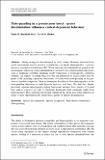Files in this item
Mate-guarding in a promiscuous insect : species discrimination influences context-dependent behaviour
Item metadata
| dc.contributor.author | Burdfield-Steel, Emily R. | |
| dc.contributor.author | Shuker, David M. | |
| dc.date.accessioned | 2015-02-18T16:01:01Z | |
| dc.date.available | 2015-02-18T16:01:01Z | |
| dc.date.issued | 2014-11 | |
| dc.identifier | 158980831 | |
| dc.identifier | e8aa1b65-b2aa-4b33-9773-cefbd87e2e22 | |
| dc.identifier | 000344075200004 | |
| dc.identifier | 84911957972 | |
| dc.identifier | 000344075200004 | |
| dc.identifier.citation | Burdfield-Steel , E R & Shuker , D M 2014 , ' Mate-guarding in a promiscuous insect : species discrimination influences context-dependent behaviour ' , Evolutionary Ecology , vol. 28 , no. 6 , pp. 1031-1042 . https://doi.org/10.1007/s10682-014-9726-7 | en |
| dc.identifier.issn | 0269-7653 | |
| dc.identifier.uri | https://hdl.handle.net/10023/6123 | |
| dc.description | Funding: NERC studentship | en |
| dc.description.abstract | Mating strategy is often informed by social context. However, information on social environment may be sensitive to interference by nearby heterospecifics, a process known as reproductive interference (RI). When heterospecific individuals are present in the environment, failures in species discrimination can lead to sub-optimal mating behaviours, such as misplaced courtship, misplaced rivalry behaviours, or heterospecific copulation attempts. All aspects of mating behaviour that are influenced by social context may be prone to RI, including copulatory behaviours associated with mate-guarding in the presence of possible competitors. Here we investigate the effect of three heterospecifics on the mate-guarding behaviour of male Lygaeus equestris seed bugs. We find that, despite previously reported heterospecific mating harassment amongst these species of lygaeid bug, male L. equestris are able to effectively distinguish rival conspecific males from heterospecifics. Thus, heterospecific mating attempts in this group may reflect selection on males to mate opportunistically, rather than a failure of species discrimination. | |
| dc.format.extent | 12 | |
| dc.format.extent | 440001 | |
| dc.language.iso | eng | |
| dc.relation.ispartof | Evolutionary Ecology | en |
| dc.subject | Species discrimination | en |
| dc.subject | Species recognition | en |
| dc.subject | Reproductive interference | en |
| dc.subject | Mate guarding | en |
| dc.subject | QH301 Biology | en |
| dc.subject.lcc | QH301 | en |
| dc.title | Mate-guarding in a promiscuous insect : species discrimination influences context-dependent behaviour | en |
| dc.type | Journal article | en |
| dc.contributor.institution | University of St Andrews. School of Biology | en |
| dc.contributor.institution | University of St Andrews. Scottish Oceans Institute | en |
| dc.contributor.institution | University of St Andrews. Institute of Behavioural and Neural Sciences | en |
| dc.contributor.institution | University of St Andrews. Centre for Biological Diversity | en |
| dc.identifier.doi | 10.1007/s10682-014-9726-7 | |
| dc.description.status | Peer reviewed | en |
This item appears in the following Collection(s)
Items in the St Andrews Research Repository are protected by copyright, with all rights reserved, unless otherwise indicated.

